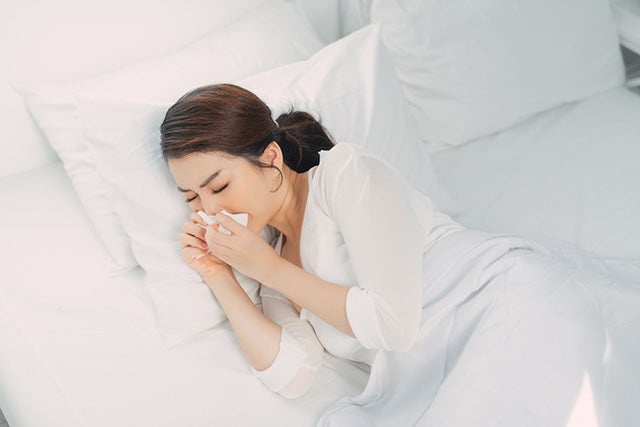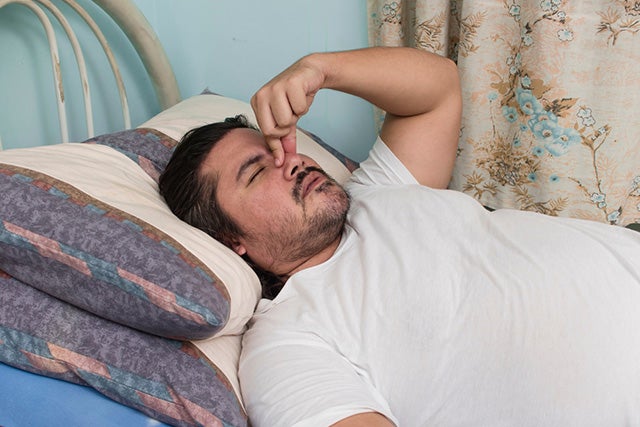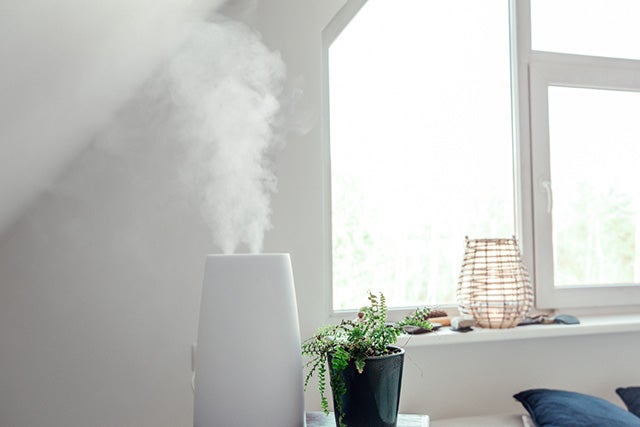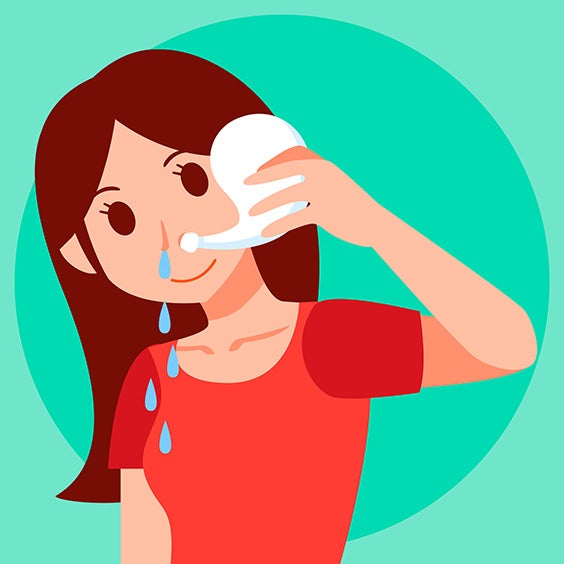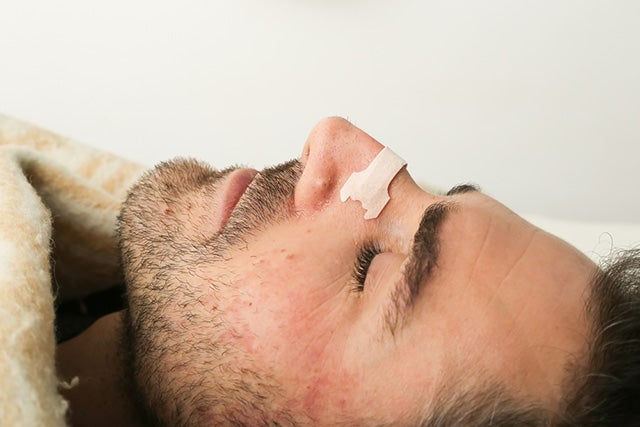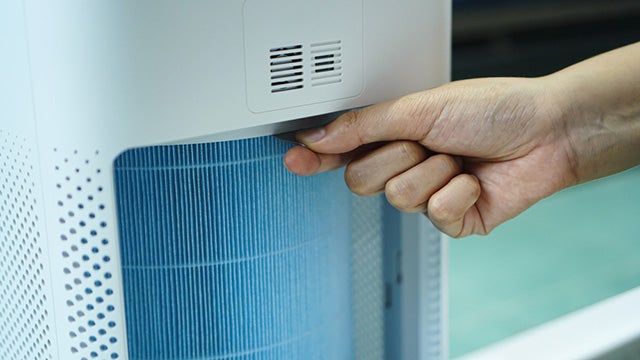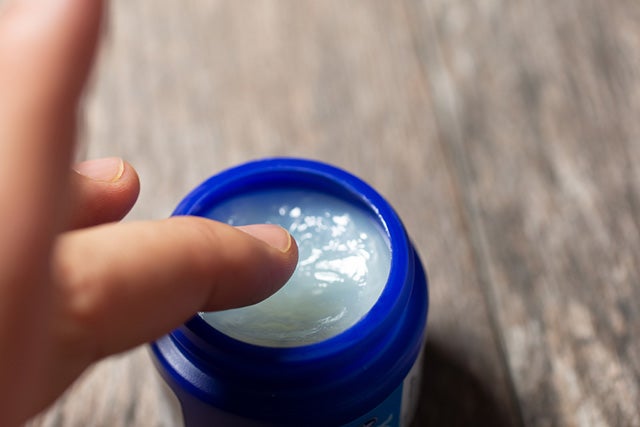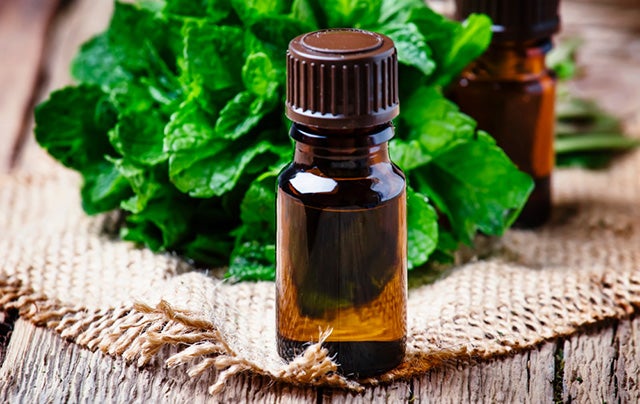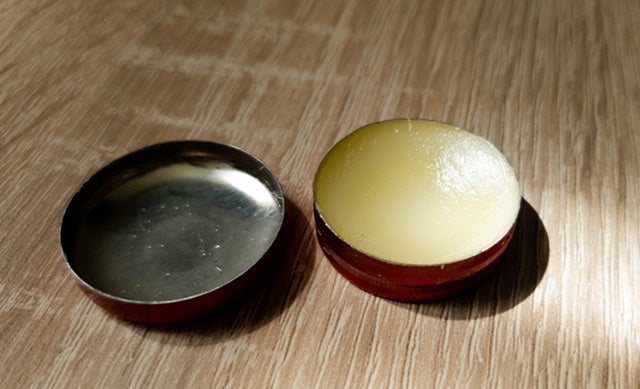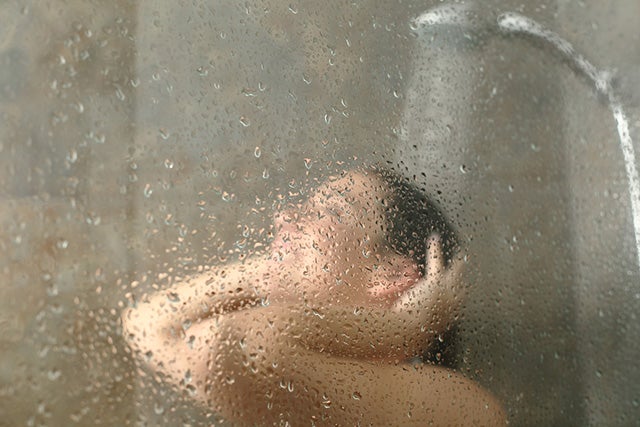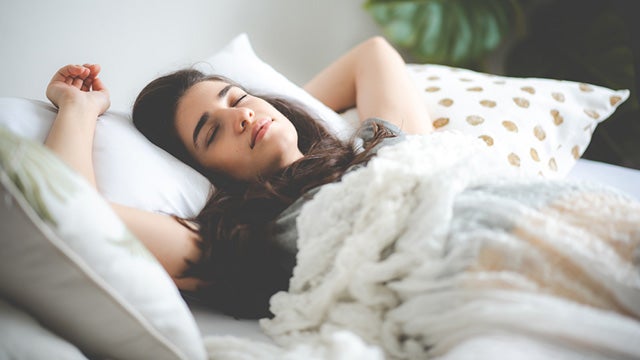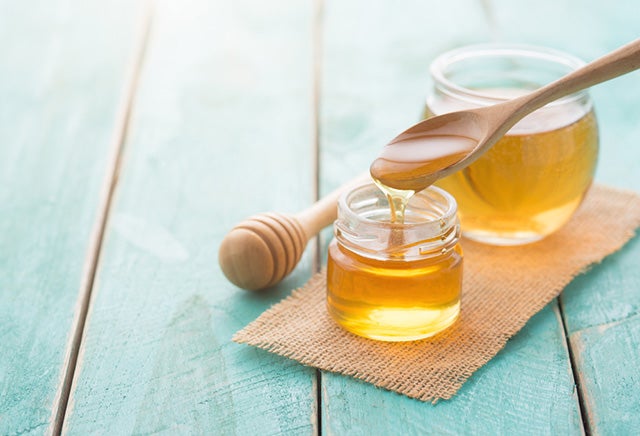Allergies got you down? Caught a cold over the weekend? Just getting prepared for the wintertime sniffles? If there was but one universal truth, it would be this:
Trying to sleep with a stuffy nose is a lamentable experience.
But fortunately, there are several things you can do to unstuff your nose and sleep more comfortably. Keep reading to learn the most effective tips and tricks!
You might want to read: Best Hypoallergenic Pillows
Use More Pillows
A tactic recommended by health practitioners the world over, sleeping with extra pillows is an effective way to reduce the most unpleasant stuffy nose symptoms. Doing so elevates your head and thus reduces the amount of blood flow it receives. This helps to drain the mucus and relieve pressure in your sinuses, ensuring a much better night’s sleep!
Note: Remember to sleep on your back for the best results!
Put a Humidifier in Your Room
Dry air can worsen a number of cold symptoms, including sore throat and stuffy nose. One of the best things you can do for your sinuses—especially during the winter, when the air is unforgiving and your heater is running nonstop—is to sleep with a humidifier in your room.
In particular, a cool-mist humidifier can help your stuffy nose problem by moistening your nasal lining to reduce pain and loosen the mucus.
Use a Nasal Spray, Nasal Rinse, or Nasal Strip
There are a range of products out there that can be sprayed up, poured into, or applied to the exterior of your nose in order to relieve symptoms of congestion or dryness.
Nasal sprays normally come in a bottle, and they are applied by closing one nostril while you spray/pump the liquid into the other. But, like most good things in life, one must do this correctly in order to see results.
Nasal rinses are similar to nasal sprays, but rather than being sprayed into the nose, they are gently poured in. You should stand by your bathroom sink with one nostril pointed downward toward the sink, and pour the saline solution into your other nostril. And, as WebMD so gracefully puts it, “Remember to breathe through your mouth, not your nose.”
If you’re not a huge fan of foreign substances entering your nasal passages, you may prefer going the nasal strip route. Essentially, nasal strips are applied to the bridge of your nose and help you breathe easily throughout the night by pulling your nostrils out a bit.
Aside from the fact that these solutions sound a bit like medieval torture, experts seem convinced that any of these three solutions can ease stuffy nose symptoms. Sprays and rinses, in particular, are known to help loosen mucus and reduce inflammation/irritation.
That said, they are also known to cause something called “rebound,” which is where your nasal passages become accustomed to the spray or rinse and cease to be assuaged by their presence.
Just don’t overdo it.
Take Allergy Medicine or NSAIDS
While you should try to avoid taking unnecessary medications, certain types can actually help a lot when it comes to cold and flu symptoms (as anyone who has ever taken Nyquil can tell you).
In addition to traditional cold and flu medicines, you can try NSAIDS (such as aspirin or Aleve) to relieve symptoms such as coughing, sneezing, ear pain, and fever. In addition, they can help reduce inflammation and swelling in the blood vessels.
Use an Air Filter
Do you have a cold? Or do you have low-key allergies disguised as a cold? Hmm…
One way to find out for sure (and to help alleviate symptoms in either case) is to invest in a good air filter and to make sure it’s doing its thing every night before you sleep. This will remove allergens from the air that are likely causing your nasal passages and sinuses much woe and dread.
Try Chest Rubs or Essential Oils
A chest rub sounds pretty sexy. But getting a good night’s sleep after suffering allergy symptoms for several weeks on end sounds a little sexier. (Right?) Well—you can have both!
Basically, you have two options when it comes to chest rubs for allergies or colds:
— Essential Oil Rubs
If you opt for an essential oil rub, you’ll find the best results if you use peppermint (makes breathing easier), eucalyptus (contains 1.8 cineole which improves sinus symptoms), or tea tree oil (contains anti-inflammatory and antimicrobial properties). Apply them using a carrier oil to help reduce the worst of your cold or flu symptoms!
Alternatively, you can also diffuse one of these essential oils using a humidifier or oil diffuser.
— Menthol Rubs
A menthol rub (such as Vicks) can work wonders for your breathing! While they do not actually open up your sinuses, menthol rubs can make you feel as though you’re breathing better due to the strong smell. Similar to how chewing mint gum makes your nasal passages feel sharp and alive!
Both essential oil rubs and menthol rubs should work well, so choose whichever you prefer or experiment with both!
Stay Hydrated
Dry nasal passages and scratchy throats quake in the presence of proper hydration! Drinks lots of water (and maybe even decaffeinated teas) but avoid alcoholic beverages until you’re feeling 100% again.
Make it Steamy
A chest rub, and now a hot shower. Things are getting steamy—and they should be!
(I’m still talking about your stuffy nose; in case you’re wondering…)
Exposing yourself to warm steam can help keep your nasal passages moist and drain your sinuses. The most common ways to do this are by taking a hot shower, hanging out in the bathroom with a hot shower running, or bending over the sink with hot water running. If you choose the last option, you may get the best results by lightly covering your face with a clean towel; this will absorb extra steam.
Practice Good Bed Hygiene
Before you keep scrolling—I promise not to preach this point too much. After all, you already know the essentials, right?
- Regular bedtime and waking up time
- No caffeine or alcohol before bed
- Minimal blue light exposure before bed (a.k.a. TV, cell phone, computer)
Aside from that, make sure that you frequently clean your sheets and pillowcases. They can accumulate a variety of nasty bacteria, viruses, fungi, dust mites, and dead skin cells over time. These things are not only gross, but they can also cause allergy flareups—and thus, a stuffy nose.
Enjoy Some Consumables
Food is medicine. You are what you eat. An apple a day keeps the doctor away.
But seriously.
There are a few specific food and beverage items you may want to try in order to gain relief from your stuffy nose and other cold or flu symptoms.
Teas
While drinking too much tea (especially caffeinated) can dehydrate you, teas offer a range of benefits that will help you kick that cold. Tea is like anti-everything! To give you an idea, they’re:
- Antiviral
- Anti-inflammatory
- Antioxidant
Adding a bit of honey (which we’ll talk about later) can amp up the benefits even more! Lemon is another great option, considering its infection-fighting properties.
Soup
Yes, this is a cliché. But experts agree that soup has that something special when it comes to soothing all manner of cold and flu symptoms—including your stuffy nose.
- The broth helps hydrate you (and it’s pretty darn comforting, too).
- Does your soup have noodles or rice? That’s extra vitamins, minerals, and carbs that your body needs right now.
- Veggies kind of speak for themselves here.
- Chicken or turkey included? More power to you.
Anyway, your favorite chicken noodle soup recipe might be just what you need to soothe your sinuses before bed! Many soups have anti-inflammatory properties and plenty of nutritious ingredients.
Honey
Whether you prefer your honey in tea or by the spoonful, it can work wonders for your situation. Honey is a known cough suppressant that also works to soothe a sore throat by coating it.
When to See a Doctor
If you follow the tips in the article, you’ll most likely get yourself a good night’s sleep and feel all better within the week. But what if your symptoms persist or you notice other strange things happening in the sinus area? Here’s when to see a doctor:
- If you have green discharge
- If you’re experiencing facial pain
- If you have a fever
- If you experience bleeding, especially from your nose
- If your symptoms last longer than 1-2 weeks
- If you’re struggling to breathe (more than usual, anyway)
Children, elderly people, or those who have a weakened immune system should also be carefully monitored when sick and taken to see a doctor should symptoms persist or worsen.
Conclusion
Stuffy noses and their accompanying symptoms can really put a damper on things, especially in the sleep department. But luckily, there are plenty of things you can do to help alleviate the worst of your symptoms and get good sleep with a stuffy nose.
If your symptoms persist more than a couple of weeks or you notice strange symptoms that you know aren’t normal for you, it might be wise to see a doctor. And check out our other helpful sleep health tips like sneezing in your sleep!
What stuffy nose remedies work best for you? Are there any we missed? Let us know in the comments and join the conversation!
Photo credit: Makistock/Shutterstock; MDV Edwards/Shutterstock;
FotoHelin/Shutterstock; AT Production/Shutterstock;
aririnstory/Shutterstock; BjornBecker/Shutterstock;
mansong suttakarn/Shutterstock; TonelsonProductions/Shutterstock;
5PH/Shutterstock; fizkes/Shutterstock; Antonio Guillem/Shutterstock;
Chokniti Khongchum/Shutterstock; Marian Weyo/Shutterstock;
Brent Hofacker/Shutterstock; showcake/Shutterstock;
Image Point Fr/Shutterstock
